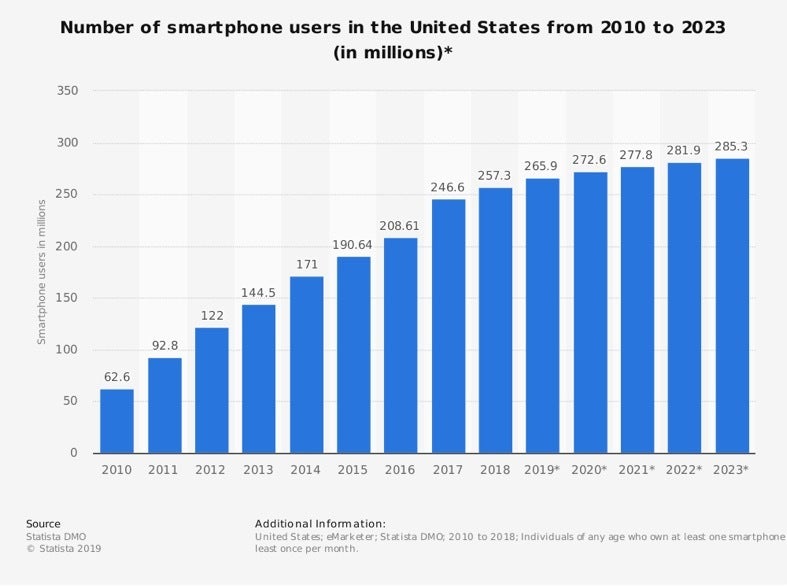 It’s been 13 years since Apple introduced the iPhone in June 2007, eventually launching smartphones into ubiquity.
It’s been 13 years since Apple introduced the iPhone in June 2007, eventually launching smartphones into ubiquity.
Today, for most parents it’s no longer a question of if you’ll get your child a cellphone, smartphone or tablet, but when.
Experts and parents alike, though, have been divided on what is the right age to give your child a smartphone. Although the World Health Organization has guidelines on recommended screen time for kids, there’s no long-term research yet on the effect of mobile phones on children or risks of prolonged screen time.
If you’re concerned about what age should a child get a cellphone (let alone a smartphone), here’s what the research has to say.
-
How common are smartphones?
A majority of Americans (96%) own a cellphone, but where mobile devices have seen the most growth is in the rise of smartphones, according to Pew Research Center data. Smartphone ownership has grown from 35% of Americans in 2011 to 81% in 2019.
In the United States, there were an estimated 257.3 million smartphone users in 2018. That number is expected to grow to 265.9 million in 2019 and upwards of 285.3 million by 2023, according to Statista data.

According to ZDNet, in Q4 of 2017, Apple sold 77.3 million iPhones globally, coming out to 35,000+ every hour or 590 iPhones sold every minute! That’s a lot of smartphones. Additionally, Statista data shows that the number of tablet users has also grown from 148.9 million to a projected 185 million in 2020.
-
What's the deal with kids and cellphones?
With such high smartphone adoption in the U.S., it’s no surprise that 45% of children between the ages of 10 and 12 years old got a smartphone with a service plan, according to 2017 Nielsen data.
Of the children who received a smartphone, 22% received one at age 10, followed by 16% at age 8 and then it tied at 15% for ages 9 and 11.
-
When should kids have cellphones?
So, when is the right time to get your child a smartphone or tablet? There are a few different theories about kids and cellphones.
The American Academy of Pediatrics Theory
According to the American Academy of Pediatrics, there’s no “right” age for children to start using technology. There’s also no rush. What’s important, they emphasize, is for parents to decide what makes sense for their children based on their family needs.
“We can keep the pace reasonable and developmentally appropriate and allow our kids to use technologies that make sense without granting them access to technologies that don’t make sense for their age,” the Academy states.
So, the Academy recommended introducing technology as needed and creating a Family Media Use Plan. This includes things like a media curfew, establishing technology values, discussing how the internet works, walking through use cases and more.
The Bill Gates Theory
Microsoft billionaire Bill Gates is clearly enthusiastic about the impact of technology on our world, but that doesn’t mean he’s ready to hand over a smartphone to his kids at just any age.
Gates did an interview with The Mirror in 2017 where he confirmed that his three children didn’t get smartphones until the age for 14 — much to their displeasure. He added that the family also sets other usage and screen time limits.
“We don’t have cellphones at the table when we are having a meal, we didn’t give our kids cellphones until they were 14 and they complained other kids got them earlier,” Gates said in the interview.
“We often set a time after which there is no screen time and in their case that helps them get to sleep at a reasonable hour.”
The Common Sense Media Theory
The nonprofit Common Sense Media has been providing “expert reviews, objective advice [and] helpful tools” on media and technology for kids since 2003. On their website, Common Sense Media emphasizes that what age should a child get a cellphone “is really up to you” and depends on your child’s maturity level, ability to follow rules and guidelines, sense of responsibility and the needs of your family.
However, James P. Steyer, chief executive of Common Sense Media, has said in interviews that for his family personally, the rule is no smartphone until after children start high school and even then only after “they have learned restraint and the value of face-to-face communication.”
Steyer does acknowledge that every family will be different, stating: “No two kids are the same, and there’s no magic number. A kid’s age is not as important as his or her own responsibility or maturity level.”
The Harvard Graduate School of Education Theory
According to the Harvard Graduate School of Education, it’s less about the right age for kids and cellphones and more about whether you’ve laid the groundwork on “healthy and responsible device use.”
Harvard recommends laying this ground by:
- Discussing the family values with your children
- Speaking with kids about technology, its uses, its effects, etc.
- Modeling and teaching responsible device use from a young age
- Understanding how your child is using technology and devices at school
- Reducing reliance on texting to communicate with your child
- Developing rules, guidelines and limits together
- Catering the rules to each child and allowing the rules to evolve with age
The Wait Until 8th Theory
Founded by a group of parents, the Wait Until 8th pledge “empowers parents to rally together to delay giving children a smartphone until at least 8th grade.” Parents can take the pledge to hold off on giving their child a smartphone until 8th grade or later and rally other parents in their school to join them to make the pledge “active.”
“Smartphones are distracting and potentially dangerous for children yet are widespread in elementary and middle school because of unrealistic social pressure and expectations to have one,” their website states.
Like other theories, Wait Until 8th acknowledges there may be times when you need to get in contact with your child. Instead of a smartphone, they recommend getting a basic phone that only allows calls and text without a data plan.
-
Should your kids have cellphones?
As we can see, it really depends on your family situation and your child. If you feel your child is responsible enough or there’s a family need for everyone to be connected, then the right time for your kids to have a smartphone may be sooner than other families — or it may be later.
The most important things to keep in mind are to address the responsibility that comes with having a smartphone or tablet, establish guidelines and screen time limits, set parental controls when necessary and keep an eye out for cyberbullying.
Original source: https://www.allconnect.com/blog/right-age-to-give-child-smartphone